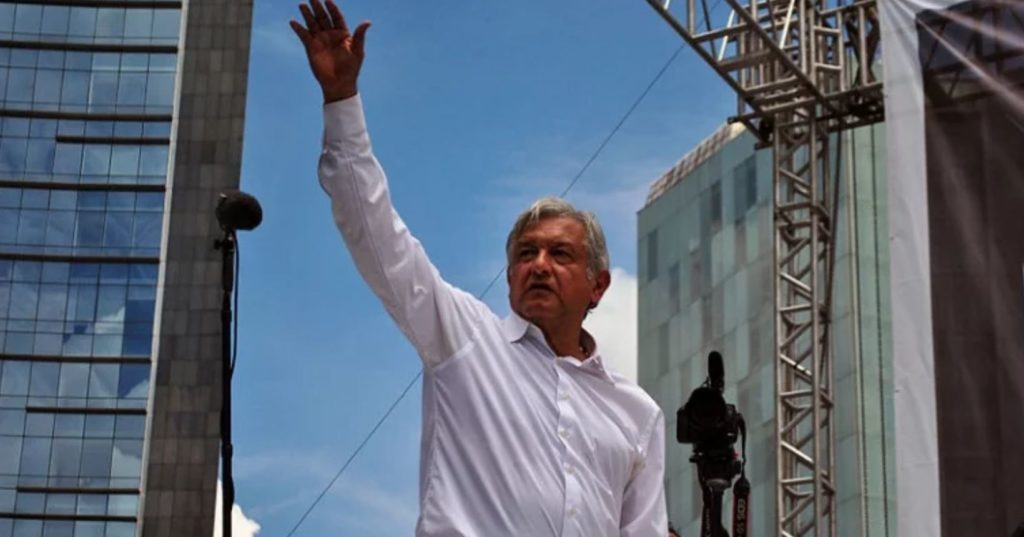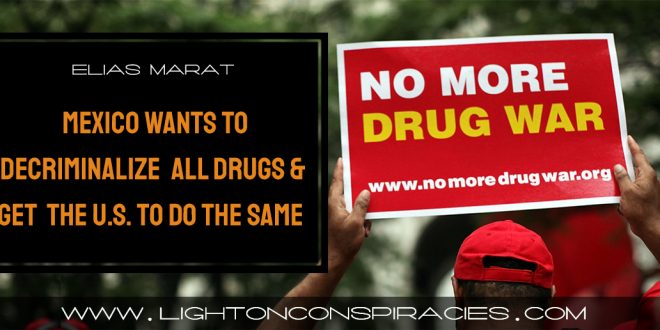 By Elias Marat
By Elias Marat
In a bold move, Mexican President Andres Manuel Lopez Obrador—commonly referred to by his initials AMLO—has issued a proposal that would see nearly all drugs decriminalized in the country and calls for negotiating with the United States to take similar steps.
The move would be a drastic turnaround for a country that has been plunged into violence, corruption, and organized crime thanks to the war on drugs and raging battles between cartels vying for control of the illicit drug trade. Mexican experts believe that the decriminalization of narcotics—such as marijuana, cocaine, and opium poppies—would lead to a drastic reduction in the violence that has racked the North American country over the past years.
Funds typically used in the never-ending battle with cartels would instead be transferred toward the treatment and rehabilitation of addicts, addressing the root causes of addiction. In the meantime, Mexican diplomacy would be geared toward ensuring the success of the new strategy with international partners—and especially the U.S., which is the key consumer of drugs produced in, or trafficked through, Mexican territory.
Santiago Roel Garcia, the founder of Mexican public safety group Semáforo Delictivo, believes that the legalization of some narcotics could see murders plunge by up to 80 percent, given the significant blow to the power of organized crime that an end to prohibition would entail.
The plan would make good on AMLO’s pledges to drastically change the manner in which Mexico has been governed for decades. In the policy proposal, included in AMLO’s National Development Plan for 2019-2024, the government argues that the current “prohibitionist strategy is unsustainable,” adding that “the ‘war on drugs’ has escalated the public health problem posed by currently banned substances to a public safety crisis.”
The document also notes that an end to prohibition is “the only real possibility” in terms of addressing the crisis.
This should be pursued in a negotiated manner, both in the bilateral relationship with the United States and in the multilateral sphere, within the [United Nations] U.N.
The announcement by AMLO was welcomed by anti-crime crusaders in the country such as Juan Francisco Torres Landa, the secretary-general of Mexico United Against Crime (MUCD), who told La Neta Noticias that the move will be a watershed in the fight to undermine the power of the country’s formidable drug cartels.
BOOK AD
SHADOW OF TEARS
by Ole Dammegard
What happened in Iran changed his life. His entire world, his viewpoints and values were turned upside down and the emotional turbulence he experienced tore down his inner walls leaving him naked and vulnerable – like an open wound. After a tragic murder, the situation became unbearale for one of his Iranian friends, so he ventured everything to help him get away and together the mad a dramatic escape from Iran via former Soviet and East Germany in a desperate attempt to reach Sweden. This book is a true and emotional description of real people in improbable world full of conflicts. It opens doors and spreads light on another Iran, its people and also, not least, the political and social conditions in the country. It is permeated by passion and tension as well as human ideals such as non-violence, tolerance and love.
Buy the paperback here Buy the eBook here
Dismissing the idea that legalization will lead to a boom in addictions, Torres added:
The authorities should regulate doses, quality, quantity and consumption, as factors that can be controlled with an eye toward measuring the possible damage to health. It is major hypocrisy, this idea that regulating drugs will somehow lead to higher consumption.
The idea has also found support north of the border. Steve Hawkins, executive director of the Marijuana Policy Project, told Newsweek:
The war on drugs has been extremely costly, not just in terms of government resources, but also human lives, and it has failed to accomplish its objective… Prohibition policies have, by and large, caused more harm to people and communities than the drugs they were intended to eliminate, and they haven’t come anywhere close to eliminating the supply or the demand.
However, the Mexican government won’t necessarily legalize all narcotics in one fell swoop. Instead, a drug possession table would be introduced that would largely allow consumers to possess small amounts of a given drug—for example, up to 30 grams of marijuana under one law proposed last November—while also looking at ways in which opium poppy production throughout the country can be retooled toward commercial medicines such as morphine and codeine. Mexico is already moving fast toward decriminalizing marijuana and legalizing its recreational use and sale.
Maria McFarland Sánchez-Moreno, the executive director of the reform-oriented nonprofit Drug Policy Alliance, said:
Mexico’s president is rightly identifying one of the major drivers of violence and corruption in his country: the prohibition of drugs … The next step is to translate words into action, by pursuing both a domestic and international agenda of drug policy reform, grounded in respect for human rights.
This article was sourced from The Mind Unleashed.










